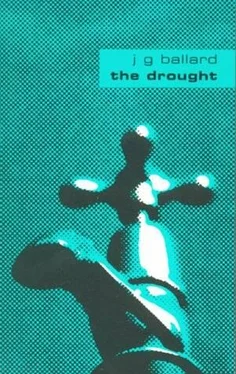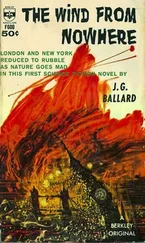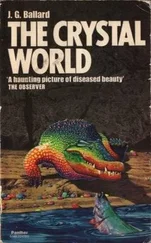The abrupt transition from Larchmont, which still carried a faint memory of normal life, surprised Ransom. Here, within the perimeter of the city, the exodus had been violent and sudden. Now and then a solitary figure hurried head down between the lines of cars. Once an ancient truck crammed with an entire family's furniture and possessions, parents crowded into the driving cabin with three or four children, jerked across an intersection a hundred yards in front of them and disappeared into the limbo of sidestreets.
Half a mile from the zoo, the main avenue was blocked by a dozen cars jammed around a large articulated truck that had tried to reverse into a narrow drive. Whitman swore and glanced briefly to left and right, and without hesitating swung the tanker off the road into the drive of a small singlestory house. They roared past the kitchen windows, crushing a dustbin with the fender, and Ransom saw the startled faces of a gray-haired old couple, a man and his wife, watching them with terrified eyes.
"Did you see them?" Ransom shouted, casting his mind two or three weeks ahead, when the couple would be alone in the abandoned city. "Is no one helping them?"
Whitman ignored the question. Ransom had persuaded the one-eyed driver, against his better judgment, to take him to the zoo, on the pretext that he would be able to add an anti-rabies vaccine to the water. Obsessed with his animals, Whitman seemed to have lost all interest in anyone else.
A white picket fence separated the end of the alley from the drive of the house on the parallel street. A car had stalled between the gates on the edge of the sidewalk. Barely reducing speed, Whitman drove on and flattened the fence. The brittle sticks splintered like a row of matches. Carrying a section on the bumper, they moved past the windows of the house, then slowed fractionally before the impact with the car. Its doors slamming, it was catapulted out mto the road, denting the grille of a small truck, then rolled across the camber and buried its bonnet in the side of an empty convertible. The windscreen frosted and the windows splintered and fell into the roadway.
Somewhere a dog barked plaintively.
"Look out!" Ransom warned.
Fifty yards away two silent figures watched them from behind the corner of a house. Their black shawls, streaked with white ash, covered their squat, broadcheeked faces. They gazed at Ransom with stony eyes, like the members of some primitive monastic order.
"Fishermen's wives," Ransom said. "They're coming down from the lake."
"Forget them," Whitman said. "You can worry when they start moving in packs."
Ransom sat back, realizing for the first time that even if this grim prospect were ever to materialize he himself would not be there. This change of heart had received its impetus from his meeting with Lomax and his sister. There he had accepted that the role of recluse and solitary, meditating on his past sins of omission like a desert hermit on the fringes of an abandoned city, would not be viable. The blighted landscape and its empty violence, its loss of time, would summon its own motives.
These latent elements in Lomax and Miranda were already appearing. Curiously, Lomax was far less frightening than Miranda. Her white hair and utter lack of pity reminded him of the specter that appeared at all times of extreme exhaustion-the yellow-locked, leprous-skinned lamia who had pursued the Ancient Mariner. Perhaps this phantom embodied certain archaic memories of a time, whether past or future, when fear and pain were the most valuable emotions, and their exploitation into the most perverse forms the sole imperative.
It was this sense of remorseless caprice, with its world of infinite possibilities unrestrained by any moral considerations, which had its expression in the figure of the white-haired witch. As he watched the abandoned houses stretching along the ash-covered streets, and heard the restive cries of the animals in the zoo as they skirted its wall, he saw an image of Miranda squatting in her filthy robe by some hearth among the smoking rubble, her old crone's face like a perverted cherub's.
Yet Lomax's references to the future, and his own confusion of the emerging landscape with the past, tantalized him. These last days in Larchmont seemed to offer him a choice of direction, but already he sensed that Lomax had been right. If the future, and his whole sense of time, were haunted by images of his own death, by the absence of identity beyond both his birth and grave, why did these chimeras not coincide more closely with the terrifying vision of Miranda Lomax? He listened to the baying of the animals, deep raucous cries like tearing fabric, thinking to himself: they'll wake the dead.
They approached the gates of the zoo. Whitman stopped the tanker at the metal barrier lowered across the service entrance. Ransom climbed out and raised the boom, and the tanker drove on behind the cages to the pumphouse.
Ransom walked across the central promenade of the zoo. Some twenty pink flamingos huddled together in a shallow trough at one end of the rockpool, the water sunk to a pallid slush between their feet. Sheets of matting covered the wire mesh over the pool, but the birds fretted nervously, opening their beaks silently at Ransom.
A monotonous chorus of bellows and grunts sounded around the zoo, the visceral cries reflected off the concrete pens. The smaller cages housing the ornamental birds and monkeys were empty. In one of the stalls a dead camel lay on the floor. Nearby, a large Syrian bear prowled restlessly about its cage, arms and head rolling around the bars. A hyena stared at Ransom like a blind pig, emitting an endless whine. Next to it a pair of cheetahs flicked around their cages, their small killing heads swiveling as Ransom passed.
An attempt had been made to feed and water the animals. Clumps of monkey meat lay on the floors, and there were a few pails of water, but the cages were as dry and arid as desert caves.
Ransom stopped in the entrance to the lion house. A roar of noise greeted him, striking his head like a fist. The five white-haired lions-two pairs and a single older male- were about to be fed, and their roars sounded like the slamming of a steel mill. Striding up and down the narrow aisle between the rail and the bars was Catherine Austen. Her white shirt and riding breeches were stained with dirt and perspiration, but she moved without any sign of fatigue, hoisting a pail of meat under the noses of the lions as she tossed the gobbets through the bars. For a moment Ransom thought she was tormentjpg them, but the lions bounded up and down, catching the meat in their jaws.
"Come on, Sarah, up, up! You're as slow as a cow! No, Hector, here!" At the end cage, where the single lion, a blind old male with a ragged mane and a hide of dulled yellow, was swinging left and right like a demented bear, hoarse with bellowing, she heaped the meat through the bars almost into his jaws.
As they gulped the meat down Catherine moved back along the cages, rattling her pail against the bars. Recognizing Ransom, she beckoned him toward her, then began to rake out the cages with a long-handled broom, tripping playfully at the lions' legs.
"Who's this?" she called over her shoulder. "The veterinary?"
Ransom put his valise down on a bench and walked over to her. "Your good friend Whitman gave me a lift. He's brought Lomax's water."
Catherine pulled her broom from the cage with a flourish. "Good for him. I wasn't going to trust Lomax until I saw it come. Tell Whitman to pump it into the reserve tank."
Ransom moved along the cages, the smell and energy of the lions quickening his blood. Catherine Austen seemed to have cast away all her lethargy and moodiness.
"I'm glad to see you, doctor. Have you come to help?"
Ransom took the broom from her and leaned it against the wall. "In a sense."
Читать дальше
Конец ознакомительного отрывка
Купить книгу








